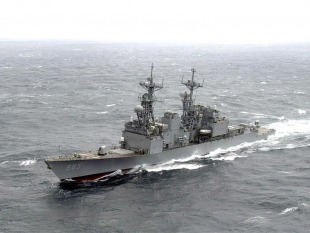Эсминец USS Cushing (DD-985)
Основная информация
Главные размерения
Машина
- 4 * General Electric LM2500 gas turbines
- 2 * shafts, 80,000 shp (60 MW)
Персонал
Боевые силы и средства
- AN/SPS-40 air search radar
- AN/SPG-60 fire control radar
- AN/SPS-55 surface search radar
- AN/SPQ-9 gun fire control radar
- Mark 23 TAS automatic detection and tracking radar
- AN/SPS-65 Missile fire control radar
- AN/SQS-53 bow mounted Active sonar
- AN/SQR-19 TACTAS towed array Passive sonar
- Naval Tactical Data System
- AN/SLQ-32 Electronic Warfare System
- AN/SLQ-25 Nixie Torpedo Countermeasures
- Mark 36 SRBOC Decoy Launching System
- AN/SLQ-49 Inflatable Decoys
- 2 * 5 in (127 mm) 54 calibre Mark 45 dual purpose guns
- 2 * 20 mm Phalanx CIWS Mark 15 guns
- 1 * 8 cell ASROC launcher (removed)
- 1 * 8 cell NATO Sea Sparrow Mark 29 missile launcher
- 2 * quadruple Harpoon missile canisters
- 2 * Mark 32 triple 12.75 in (324 mm) torpedo tubes (Mk 46 torpedoes)
- 1 * 61 cell Mk 41 VLS launcher for Tomahawk missiles
- 1 * 21 cell RIM-116 Rolling Airframe Missile launcher
- 2 * Sikorsky SH-60 Seahawk LAMPS III helicopters
The USS Cushing (DD-985), honoring Commander William Barker Cushing, marked the fifth vessel within the United States Navy to bear this title. Cushing was a Spruance-class destroyer crafted by the Ingalls Shipbuilding Division of Litton Industries in Pascagoula, Mississippi. For the latter phase of its tenure, Cushing operated from Yokosuka, Japan. Serving as the final active Spruance-class destroyer, it was decommissioned on September 21, 2005.
The construction of Cushing began on December 27, 1976, in Pascagoula, Mississippi. Its launch took place on June 17, 1978, followed by commissioning on September 21, 1979. Notably, Cushing became the last American warship to traverse the Panama Canal before its jurisdiction was handed over to Panama in 1979.
Before formal commissioning, Cushing left its Mississippi shipbuilders to evade an approaching Hurricane Frederic. Sheltering in the Gulf of Mexico with a contingent of U.S. Navy personnel and shipyard workers, it later returned to the shipyard for final touches. The ship was promptly commissioned with its crew in dungarees within the helo hangar and deck before setting sail for its primary homeport, San Diego, California, where it was formally commissioned.
Throughout the mid-to-late 1980s, Cushing belonged to the Pacific Fleet Anti-Submarine Warfare Squadron—Destroyer Squadron 31. It underwent special modifications to support DESRON staff operations, serving as the primary flagship. Moreover, it was one of the few ships in its class to carry the AN/SQR-15 Towed Array Sonar System.
In the early 1990s, Cushing showcased the efficacy of rudder roll stabilization (RRS). Engineers from the Carderock Division of the Naval Surface Warfare Center installed and monitored this developmental RRS system, eventually implementing it in Arleigh Burke-class (DDG-51) destroyers.
During various deployments, Cushing engaged in multinational exercises like CARAT '98, emphasizing U.S. dedication to stability in Southeast Asia. It participated in exercises like MTX 99, Foal Eagle, SHAREM 138, and MISSILEX 01-1, showcasing its capabilities through live-fire missile exercises and successful naval operations.
Cushing's noteworthy accomplishments were acknowledged by Commander, Destroyer Squadron 15, awarding the ship the Silver Enlisted Surface Warfare Excellence Pennant in recognition of its enlisted surface warfare specialists' qualifications.
In the latter years of its service, Cushing continued operations from Yokosuka, Japan, completing multiple deployments and exercises. It eventually concluded its active service on September 21, 2005, and was struck from the Navy list. Following its decommissioning, the ship was slated for a grant transfer to Turkey and was later sunk during RIMPAC 2008. The ship's coat of arms commemorates the valor of William Barker Cushing and the legacy of vessels named in his honor.
- Комментарии
 ru
ru en
en uk
uk





 Военно-Морские Силы США
Военно-Морские Силы США Ingalls Shipbuilding
Ingalls Shipbuilding